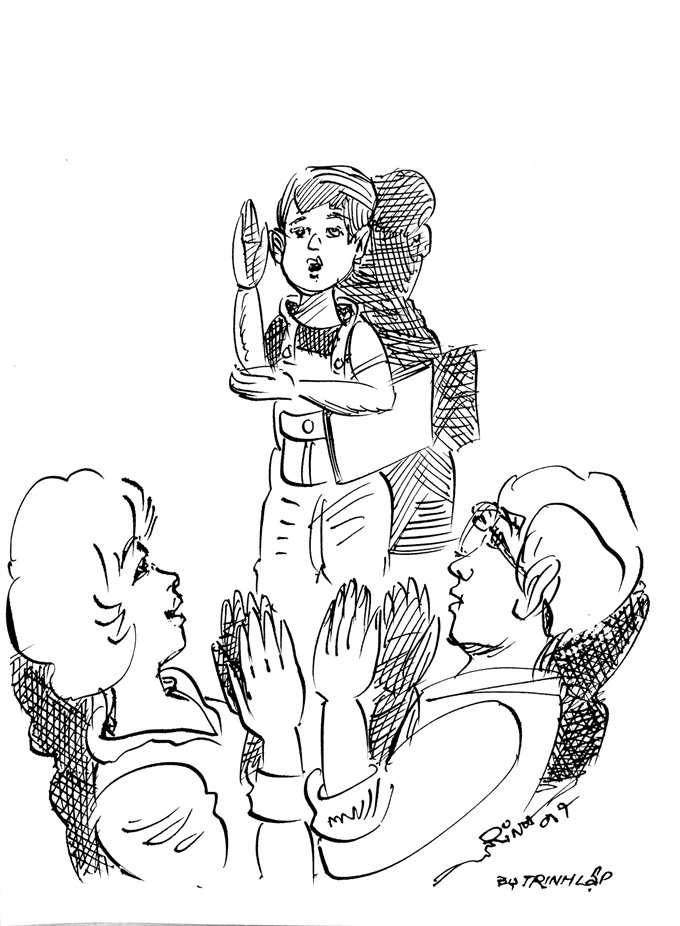 Talk Around Town
Talk Around Town

There is a long tradition in Việt Nam that adults are always right and children have a responsibility to listen and obey unconditionally. However, things are changing.
 |
| Illustration by Trịnh Lập |
By Minh Thu
Little K. Hà was not happy to hear a motorbike taxi driver calling her and her sister "wild swans". He said: “Yes, you will get married and move to your in-laws when you grow up, having daughters doesn’t help anything.”
Although only five, she instinctively understood the driver was expressing a chauvinistic attitude toward girls, likening them to proverbial wild swans that fly away from their home after parents invested all they had in raising and nurturing them.
Her mother, Nguyễn Minh Trang, could see the little girl was bothered and suggested she talk to the driver. “It’s not true,” she said. “Daughters are not wild ducks. Daughters were born to be loved.”
Though the driver is unlikely to change his ingrained views of womanhood, for the child this was an important lesson about standing up for what she believes. It would not have been possible without the respect and care she received from her parents.
There is a long tradition in Việt Nam that adults are always right and children have a responsibility to listen and obey unconditionally. However, things are changing.
Vietnamese parents are willing to read books on feeding, raising and educating children. They read about the psychology of children at different ages and learn to communicate with them at eye level.
Parents nowadays care more about their children’s hobbies, feelings and opinions. Children have the right to state their views and criticise their parents. That’s why adults must set an example for children to follow.
Trang knows that what parents do can affect children’s behaviour much more than thousands of words and admonishments.
“Children know what’s right and wrong since they’re very little. So when I want my children to focus on dinner, I do it first. I turn off the TV, put my smartphone aside and have a meal with them,” she says.
Author Lê Nhất Phương Hồng, an expert on infant health, pointed out that many children are criticised for being unfriendly and disobedient toward adults. “For infants, parents are the most important people. They don’t feel a need to make friends with other adults, so most of them are shy and nervous,” says Hồng.
Tongue-in-cheek, Hồng suggests that being reluctant to say hello to strangers could even be an advantage - making children extra careful.
“I don’t think these children are impolite, naughty or stubborn. People are to blame often for not communicating with children in a suitable way,” he says.
Writer Lê Thanh Ngân, a mother of two, says she always greets children "hello" when she first meets them. “Through a word of greeting, I express that I want to get acquainted, I’m friendly and I respect them,” she explains.
“I think adults should be a prime example for children instead of telling them what to do,” Ngân adds. “Instead of asking children to say hello, why don’t we salute them first, then they will imitate. That’s the way to educate them naturally, to show them what they should do in front of adults.”
Ngân acknowledges that children often have serious matters they want to talk about and she always creates conditions for them to express their opinion, not in jest.
When Ngân gave birth to a son, her two-year-old daughter said she didn’t like her brother. Ngân patiently listened and knew that some neighbours had warned her that her parents would love her brother much more because he’s a boy.
“It’s a flat joke that harms children’s soul. It’s not a good way to communicate with children,” she says.
Pediatrician Nguyễn Thu Minh says she respects her children and consider them friends.
“I don’t tell them what to do, I give them some options and let them decide, instead. For example, I don’t ask them to clean their rooms. I just tell them if the rooms are tidy, they can play football at the weekend. Another example - red light means ’stop’. I told them ’you can jump the light, but risk a crash’, then they can choose whether to stop or crash.”
Minh developed “democracy” in her family but she also creates barriers that her sons understand they must never cross.
“When I say ‘no, my dear, no’, that means no, that doesn’t mean ‘I’m not sure’ or ‘maybe yes’,” she says. “I respect my children, and they have a responsibility to do the same for me.”
Educating children in a civilised and equal way should be a top concern for society. VNS